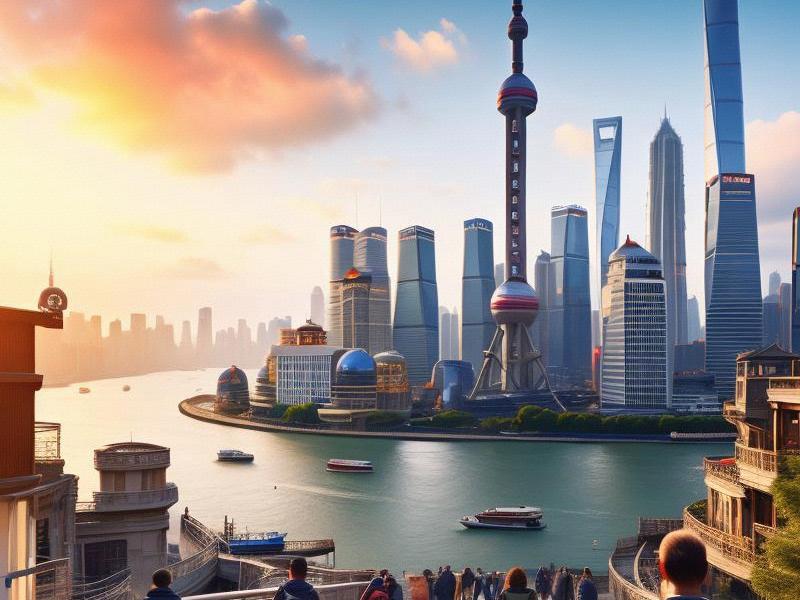
Shanghai, often referred to as the "Pearl of the Orient," stands as a testament to China's remarkable economic transformation and urbanization. This dynamic metropolis, with its blend of ancient traditions and modern innovations, has become a symbol of the country's rise on the global stage. Shanghai's story is one of resilience, adaptability, and relentless pursuit of progress.
The city's history dates back over two millennia, but it was in the 19th century that Shanghai began to emerge as a significant international port. The opening of the Treaty Ports in the mid-19th century, following the First Opium War, marked the beginning of Shanghai's transformation into a cosmopolitan city. Foreign powers established concessions in the city, bringing with them architectural styles, cultural influences, and economic opportunities that would shape Shanghai's identity.
In the 20th century, Shanghai experienced rapid industrialization and urbanization, becoming one of the most populous and economically significant cities in China. The city's strategic location along the Yangtze River and its proximity to the East China Sea made it a vital hub for trade and commerce. However, the city also faced challenges, including the impact of war and political upheaval.
The establishment of the People's Republic of China in 1949 brought significant changes to Shanghai. The city underwent extensive urban planning and reconstruction efforts, focusing on industrial development and infrastructure improvements. Despite these efforts, Shanghai's potential was not fully realized until the economic reforms initiated in the late 20th century.
Since the late 1970s, Shanghai has been at the forefront of China's economic reforms and opening-up policies. The establishment of the Shanghai Stock Exchange in 1990 marked a pivotal moment in the city's economic development. Today, Shanghai is home to the world's busiest container port, a leading financial center, and a hub for multinational corporations.
上海贵族宝贝自荐419 One of the most striking aspects of Shanghai's urban development is its skyline, which has been transformed by iconic skyscrapers such as the Oriental Pearl Tower, the Jin Mao Tower, and the Shanghai Tower. These structures not only symbolize the city's economic prowess but also reflect its commitment to modernization and innovation.
The Pudong New Area, developed in the 1990s, is a prime example of Shanghai's urban planning and economic strategy. Once a rural area, Pudong has been transformed into a futuristic district featuring high-tech industries, luxury shopping malls, and world-class hotels. The Lujiazui Financial District, located in Pudong, is home to many of the world's top financial institutions and serves as a global financial hub.
Shanghai's cultural scene is as diverse and vibrant as its economic landscape. The city boasts a rich history of art, literature, and theater, which has been enriched by the influx of international influences. The Shanghai Museum, located in People's Square, is renowned for its extensive collection of Chinese art, including ancient ceramics, calligraphy, and paintings.
The city's performing arts scene is equally impressive, with theaters such as the Shanghai Grand Theatre and the Shanghai Oriental Art Center hosting a wide range of performances, from traditional Chinese opera to contemporary ballet and music concerts. The Shanghai International Film Festival, one of the oldest and most prestigious film festivals in Asia, attracts filmmakers and audiences from around the world.
上海花千坊爱上海 Shanghai's culinary scene is a delightful blend of traditional Chinese cuisine and international flavors. The city is famous for its xiaolongbao (soup dumplings), shengjianbao (pan-fried dumplings), and various regional specialties. In addition to traditional restaurants, Shanghai offers a wide range of international dining options, from French haute cuisine to Japanese sushi and Italian pasta.
The city's commitment to sustainability and environmental protection is evident in its urban planning and green initiatives. Shanghai has implemented various measures to reduce pollution, improve public transportation, and promote energy efficiency. The city's extensive metro system, one of the largest in the world, provides a convenient and eco-friendly mode of transportation for millions of residents and visitors.
Shanghai's role as a leader in technological advancements is reflected in its innovation-driven economy and support for startups. The city has established numerous technology parks and incubators, providing resources and support for entrepreneurs and innovators. Shanghai's focus on artificial intelligence, biotechnology, and green technologies positions it as a key player in the global tech industry.
Education is another area where Shanghai excels, with a strong emphasis on academic excellence and international collaboration. The city is home to some of China's top universities, including Fudan University and Tongji University, which attract students and researchers from around the world. Shanghai's education system is characterized by a balance between traditional Chinese values and modern educational practices.
上海龙凤阿拉后花园 Despite its rapid development, Shanghai remains committed to preserving its historical and cultural heritage. The city has taken steps to protect its historic buildings and neighborhoods, such as the French Concession and the Old City, which offer a glimpse into the city's rich past. These areas are now popular destinations for tourists and locals alike, showcasing the harmonious coexistence of tradition and modernity.
Shanghai's international influence is evident in its role as a host for major global events and conferences. The city has successfully hosted events such as the World Expo in 2010 and the G20 Summit in 2016, demonstrating its ability to manage large-scale international gatherings and foster global cooperation.
In conclusion, Shanghai is a dynamic metropolis that embodies the spirit of innovation, culture, and economic progress. Its transformation from a historic port city to a global hub is a testament to the resilience and adaptability of its people. As Shanghai continues to grow and evolve, it remains a beacon of China's aspirations and a symbol of the country's commitment to a brighter future.
